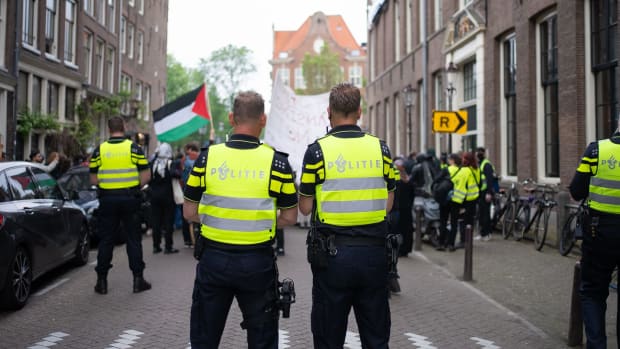
Students and teachers with residence permits think twice before demonstrating
To demonstrate or not to demonstrate? Students and staff who are on a residence permit in the Netherlands worry that participating in a protest is not without consequences. “I don’t want participation in a protest, however peaceful, to affect my right to stay in the Netherlands.”
When the planned education demonstration in Utrecht threatened to become illegal in mid-November, there was turmoil among international students and staff with residence permits. The mayor of Utrecht advised a day in advance to cancel the protest for security reasons, which could turn into a demonstration ban.
“I hesitated whether to go,” says Hayden Anderson (19), a pre-law student at Amsterdam University College (AUC) from the United States. She is in the Netherlands on a temporary residence permit, which has to be renewed every year. “I am especially cautious at informal demonstrations, because they can be illegal. And since the demonstration in Utrecht was also in danger of losing its legal status after the mayor’s advice, it did not seem wise to me.”
This concern is especially prevalent among people from outside the EU, says Pia Schardt (21), a Liberal Arts and Sciences student at AUC. “As a German student, I feel free to participate in protests because I do not need a visa to stay in the Netherlands. But with friends from India, Zimbabwe or the United States, I do see these concerns. They have serious concerns that even participating in a peaceful protest where they do nothing wrong could affect their right to stay in the Netherlands. This makes them reluctant to demonstrate and even if they participate, they often stay on the sidelines to avoid risks.”
The question, whether demonstrating with a residence permit is safe, was also raised several times in app groups of the education demonstration. In the end, the protest in Utrecht proceeded peacefully and a ban on demonstrations did not happen. But how safe is it actually to demonstrate if you have a residence permit in the Netherlands?
Crime
You don’t lose a residence permit just like that, says Bas Schotel, assistant professor in legal theory. “If you demonstrate peacefully and stick to the rules, there is nothing wrong.”
A residence permit can only be revoked if the person poses a danger to public order or national security, he continues. This is the case if the person has been convicted of a crime by a court and also receives an unconditional prison sentence, a prison sentence that is actually carried out.
And even then, the prison sentence must be long enough for a residence permit to be revoked. Here, the “sliding scale” principle applies: the longer a person is lawfully residing in the Netherlands, the higher the penalty has to be to be able to proceed to terminate the right of residence. So suppose a student has been in the Netherlands for less than three years, the unconditional prison sentence must be at least 1 day.
“But most of the time, it does not come down to a crime,” says Schotel. “Even if the mayor in Utrecht had eventually ban the demonstration, violating that ban is not a crime,” he quotes Article 443 of the Penal Code. “And so that cannot be used as grounds to revoke a residence permit.”
The pro-Palestine demonstrations that took place from May onwards were different. There, a Spanish student was eventually convicted because he had resisted arrest with “unnecessary violence”, an offence that does fall under crimes. Those demonstrations also involved occupying UvA classrooms, another offence for which you can be convicted.
But how likely is it that a peaceful demonstration will lead to a crime? Not likely, says Willem Jebbink, the criminal lawyer whose number demonstrating students sometimes write on their arms. He knows of no cases where a residence permit was revoked due to participation in a demonstration. “You are only in danger if you are a danger to public order. And peaceful demonstration is public order.”
“To play it safe, it is better not to go to a banned demonstration in advance,” Jebbink continues. Although also authorised or tolerated demonstration can escalate, but demonstrators are always given the opportunity to leave the demonstration. “If you are demonstrating on the A12 and the mayor of The Hague gives a command to leave the A12, you can leave. As long as you don’t start throwing stones or shouting that gays should die, so to speak, there is no reason to be stopped.”
However, it does happen that the police ask for identity documents too easily. Jebbink: “If you decide not to show your passsport out of principle, it does sometimes happen that you are fined for that. But that’s a small fine and I can’t imagine that the sliding scale applies to that.” Besides, you can take the matter to court. “More often than not, the police illegally ask for proof of identity, and we win those cases.”

Political climate
Despite the fact that demonstrating can only affect residence permits under Dutch law in exceptional cases, students and staff are still not comfortable with it, observes political sociologist Ladan Rahbari. Students with a residence permit – who do not want their names to appear in Folia – told her that they fear that demonstrating could still eventually impact their status as foreigners in the Netherlands.
Rahbari: “They intend to continue working in the Netherlands and eventually apply for the Dutch nationality and worry that in the current political climate, any small ‘misstep’ could be used against them.” Earlier this year, for example, BBB proposed revoking foreign students’ visas if they are guilty of vandalism. However, this can then only be done if students are convicted.
Rahbari also asked students and staff via a questionnaire in Whatsapp groups about the considerations of whether or not to demonstrate. At the time of writing, that questionnaire had been completed 25 times. It showed that students were more likely to refrain from participating in a demonstration due to their concerns, while among employees, their concerns about higher education cuts outweighed the perceived risks of demonstrating.
US immigration authorities
Concerns can also arise from within the home country. For example, US student Hayden Anderson (19) received a warning from US immigration authorities to avoid large gatherings, which heightened her concerns. “I don’t want participation in a protest, no matter how peaceful, to affect my right to stay in the Netherlands. My family lives in Spain and we are staying there on a work visa, so if problems arise, it could affect not only my studies but also my family’s right to work and stay there.”
This is why she is reluctant to participate in some protests, despite often agreeing with the message. However, she does take part in sit-ins and other organised actions within the university. And on Monday afternoon, November 25th, she decides to go to the education protest on Malieveld anyway. “I really believe in the importance of protesting, especially when there is no other way to make your voice heard.”



